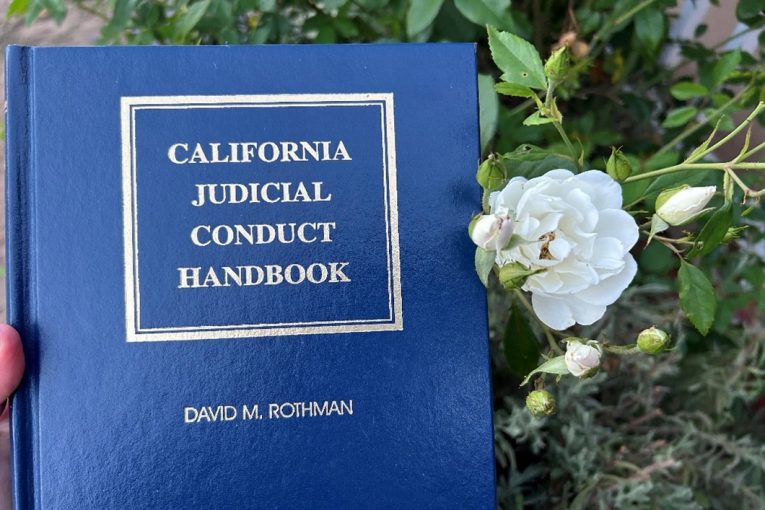
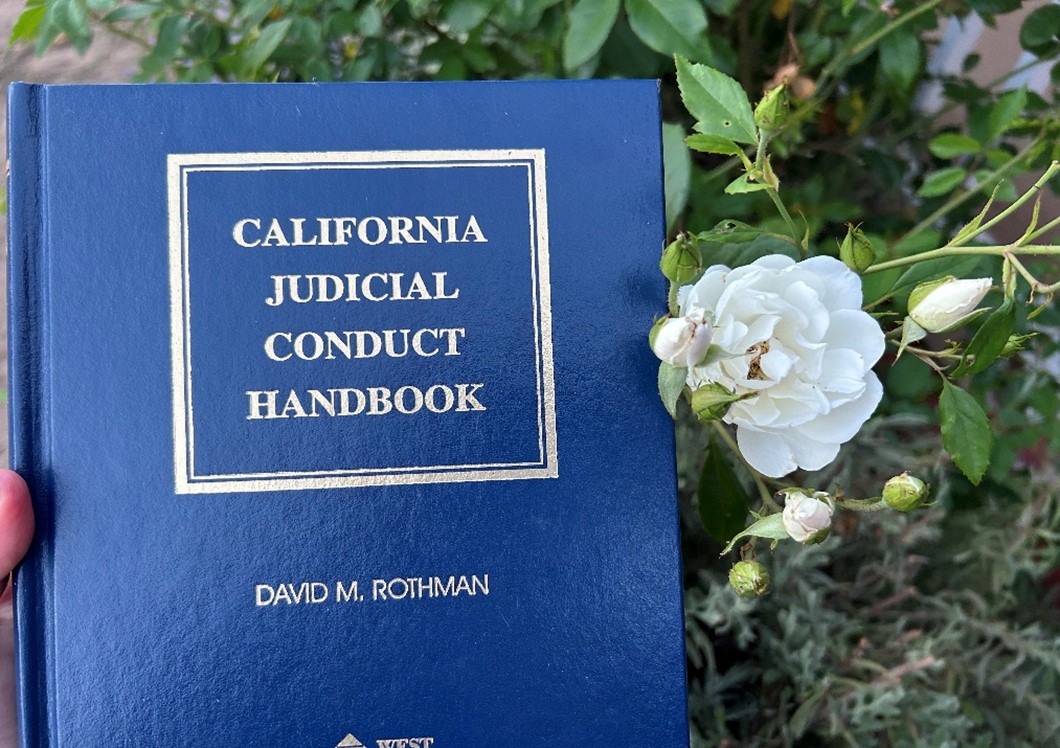
By Susan Bassi and Stephen James
At a time when judges at the United States Supreme Court and throughout the country have been embroiled in ethical controversies and outright lawbreaking, California’s Judicial Branch is remembering perhaps the most ethical judge to ever take the bench.
Judge David M. Rothman was more than a respected jurist at the Los Angeles County Superior Court. He spent much of his career training and teaching ethics and courtroom  skills to other judges. Virtually every judge in California has received training from educational materials authored or influenced by Rothman.
skills to other judges. Virtually every judge in California has received training from educational materials authored or influenced by Rothman.
Judge Rothman, the original author of the gold standard reference work about judicial ethics, the 791-page California Judicial Conduct Handbook, passed away on June 25 at age 87.
His passing marks the end of an era that began before judges had cell phones and social media accounts—a time when civility, compassion, trust in the courts, and in journalism, were the backbone of America’s democracy.

Among many of his colleagues, Rothman was a rock star judge whose work on and off the bench enhanced public respect of the courts, according to retired First District Court of Appeal Presiding Justice J. Anthony Kline.
“David Rothman’s monumental explication of the ethical standards applicable to California judges has greatly strengthened the integrity and reputation of the California judiciary, the largest judicial system in the world; its salutary effect will long endure,” Kline wrote in an email to the Vanguard.
California Supreme Court Chief Justice Patricia Guerrero expressed a similar sentiment.
“During his time on the bench, Judge Rothman was a highly regarded jurist and served with distinction on the Los Angeles court. But he will ultimately be remembered for his unparalleled leadership in judicial education, particularly his contributions to judicial ethics. His writings and teachings have helped shape the California judiciary by providing our judges with the resources to maintain their impartiality and integrity to better serve the litigants that come before them. His impact on our state’s judiciary cannot be overstated,” Guerrero said.

Despite a stellar legal career, a passion for learning, and his zeal for training and mentoring California’s most prominent judges, Rothman’s legacy is best viewed through the lens of a public service love story he penned with Phyllis, his wife of 61 years.
The Early Years: Finding His Voice in Public Service
Rothman graduated from University of California, Los Angeles (UCLA) and then attended University of Chicago Law School, graduating in 1962. While getting his legal education, Rothman still had time to indulge in what would become his lifelong passion.
“While a student at the university of Chicago’s law school, I started posting caricatures of my professors. These were posted on an open board anonymously. Eventually I was outed, and the surprising news was that I was offered an opportunity to publish the collection with the law school. Thus was born The Glass Menagerie, a name referring to the building in which the Law School was housed, a glass building designed by Eero Saarinen,” Rothman explained on his website.
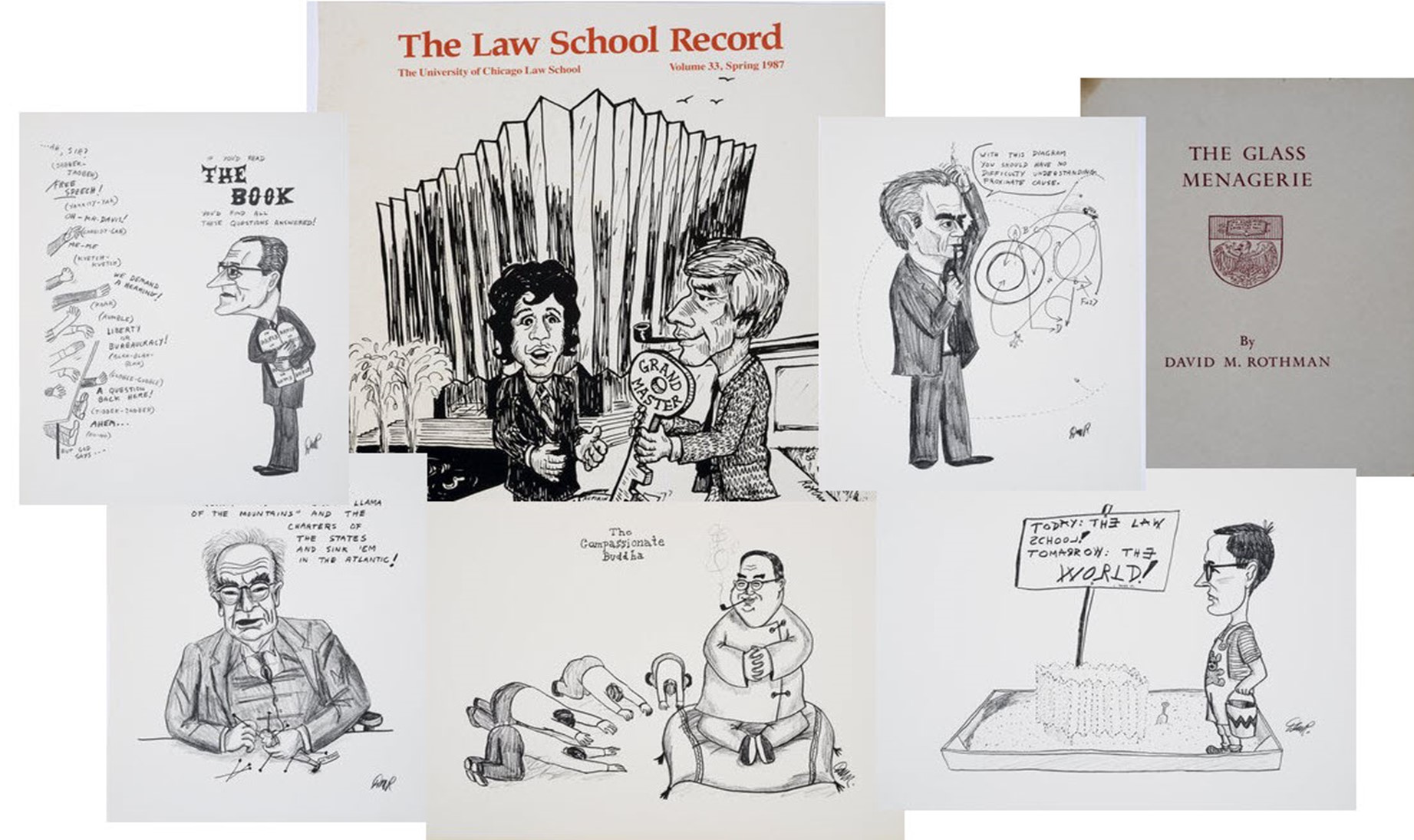
After law school, Rothman passed the California State Bar exam and became a licensed attorney in January 1963. Shortly thereafter he and Phyllis were married.
As the newlyweds started their family, Rothman started his career as a lawyer at the Los Angeles Office of the California Attorney General.
Judge David M. Rothman 1980- 1996, Los Angeles Superior Court
David M. Rothman was appointed to the bench by Governor Jerry Brown in 1979. He worked as a judge for the Los Angeles Superior Court from 1980 to 1996, where he presided over criminal, civil and family law cases. Rothman served as the supervising judge of the West District of Los Angeles in Santa Monica until his retirement.
In and out of the courtroom Judge Rothman was respected by litigants and attorneys as well as by sitting and retired judges he worked with up and down the Golden State.
Judge Jeremy Fogel served as a judge in Santa Clara County Superior Court, a United States District Judge for the Northern District of California, and Director of the Federal Judicial Center in Washington DC until 2018. He currently works as the Executive Director of the Berkeley Judicial Institute at Berkeley Law School, and said,
“David Rothman was my role model and inspiration, particularly because of our shared passion for judicial ethics. His legacy to the California judiciary is monumental: his decency and thoughtfulness touched and will continue to touch literally thousands of judges and through them have made California’s judiciary a more faithful servant of its people.”
In both public and private service, Rothman welcomed transparency. He regularly invited journalists for interviews where he was known to insist on being called “David” instead of by his formal judge title.
His steadfast moral compass, consummate mentoring, transparent mindset, kind demeanor and quick wit led to him being informally dubbed the Mr. Rogers of the judiciary.
Book of Rothman: Moral Compass for Judges in California
While working as a Superior Court judge in Los Angeles from 1980 to 1996, Rothman developed an interest and passion for judicial ethics education. Recognizing a lack of resources on the topic, he worked tirelessly to author California’s Judicial Conduct Handbook (The Book).
He was assisted in the writing process by his wife, Phyillis, whom he used as a sounding board and willing editor-at-large. The book was published in 1990 and dedicated to his wife and the memory of his parents, Margaret, and Morris Rothman.
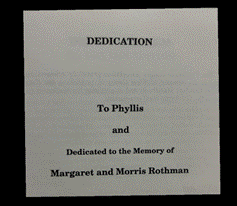
The California Judge Foundation designated Rothman’s work as the “undisputed treatise on judicial ethics.” Commonly known as “The Book,” or the “Rothman Book,” it is given to every new judge elected or appointed to the bench in the state, courtesy of the California’s Judge Association.
Judges Doing “The Right Thing”
The Book became a resource to guide judges with respect to their activities in and outside the courtroom. It covers the core principles of being a judge, judicial accountability, decision-making, the nexus between public and private conduct, and “Doing the Right Thing – The Rule of Law, Judicial Courage and Judicial Independence.”
Each of the book’s pages guides readers through lessons of the natural and probable consequences of judges failing to act ethically or do “the right thing.”

In his first edition of The Book, Rothman cautioned judges of the “danger of embroilment” (page 31) and reminded readers that a judge’s personal conduct could lead to criminal prosecution, giving an example of a judge who was prosecuted for verbally and physically abusing a police officer who stopped the judge’s son for drunk driving (page 239).
The Book reminds judges they are free to engage in the arts, sports, and other social and recreational activities with attorneys, as long as a judge feels they can remain impartial and discloses such relationships, “on the record” if those attorneys should appear before them in court (page 240).
Woven into each of The Book’s pages, are common sense reminders of appropriate judicial conduct.
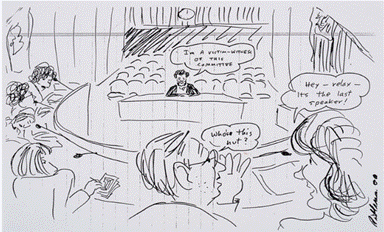
The Book is also filled with charts and legal decisions dating back to the 1930s, with an eye to modern day society.
On page 495 of The Book, Rothman covers gratuities for judges performing marriages. On page 540 he addresses exparte communications, or improper communications, with probation officers.
Additionally, The Book provides readers with an index so judges can consider every scenario where they might communicate improperly – including in public meetings, death penalty cases and with custody evaluators in family law matters (page 765).
Lessons from Rothman
Rothman’s work in judicial training begins by reminding attorneys elevated to the bench— “You’re not a lawyer anymore.”
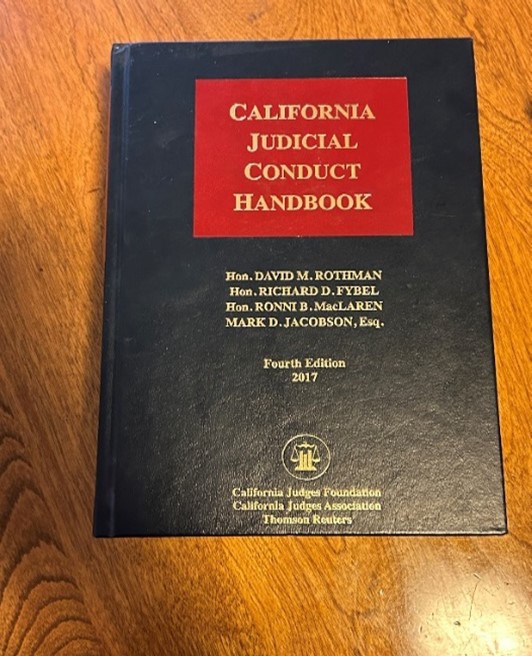
In addition to its prominence in California’s judiciary, The Book is used by attorneys, academics, self-represented litigants, and journalists covering the courts, and the state’s judge’s.
Always mindful of public trust and confidence in the judiciary, Rothman published updates to The Book in 1999 and 2005. In 2017 a fourth edition of The Book was published with contributions from Judge Richard D. Fybel, Judge Ronni B. MacLaren and attorney Mark D. Jacobson.

A Career Rooted in Social Justice and Family
In the 1970’s, before he was appointed to the bench, Rothman worked as a volunteer attorney for the American Civil Liberties Union (ACLU), where he defended demonstrators arrested at an anti-war protest in Century City. He was also responsible for establishing a program to obtain presidential pardons for draft resisters once the Vietnam War ended.
Throughout his legal career, Rothman was mindful of the importance of civil disobedience in a healthy democracy.
In 2009, after his retirement from the public court, Rothman took his grandson Miles to a special event in Northern California. In advance of the event, Rothman arranged for a meeting and photo opportunity with U.S. Congressman John Lewis , who served in the United States House of Representatives for Georgia’s 5th congressional district.
Lewis was best known for his arrests in connection with the 1960 Nashville sit-ins, the Freedom Riders.
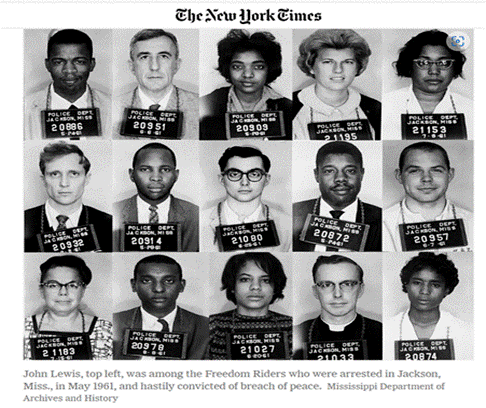
Reflecting on the experience after his grandfather’s passing, Miles said in an interview with the Vanguard that the goal that day back in 2009, had been to photograph John Lewis.
“Grandpa preferred to paint from a live model but had gotten very good at painting from photographs after doing portraits of all his squirming grandkids,” Miles explained.
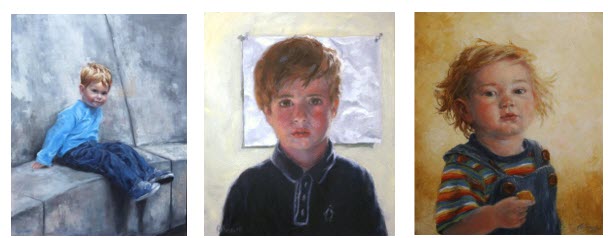
Miles recalled his grandfather’s elation at the Lewis photo session. “I remember my grandfather smiling widely from behind the camera over the ten minutes or so that he was photographing John Lewis.”
Miles got an unexpected lifetime memory. “I also remember that John Lewis pulled me into a photo. We hadn’t initially intended to take a photo together, but he invited me to join him,” he said.
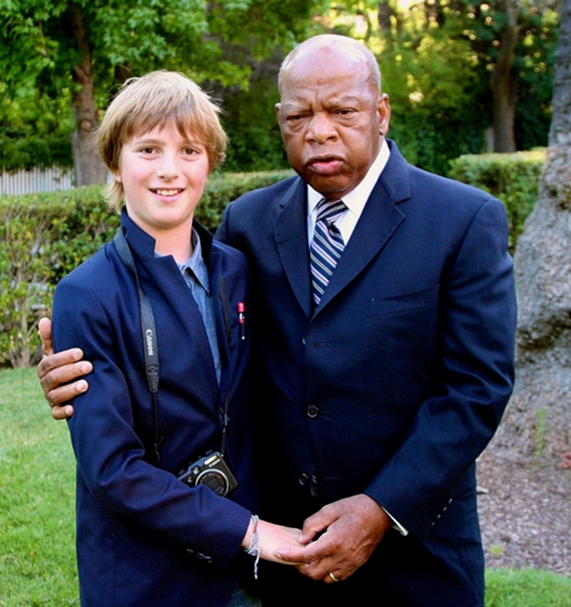
Fifteen years later, Miles shared the memory of that experience in the wake of his grandfather’s passing. “Today, I’m reflecting on the fact that he brought me with him. I guess he thought it would be a meaningful experience for me, but how considerate of him to think to bring me along! That’s a real A+ grandpa move. And I still vividly remember standing outside, the three of us, on that beautiful evening and then observing the session on forgiveness that followed.”

In 2021 Miles made the trip to the Birmingham Civil Rights Institute in Alabama where the portrait Rothman painted of John Lewis had been donated shortly after his “grampy” had moved into memory care following an Alzheimer’s diagnosis. While he made the trip without his grandfather, he noted,
“It filled me with so much pride to see his work hanging there in such a special place and for so many to appreciate.” Miles said as he again reflected on the unique experience he and his grandfather had shared.
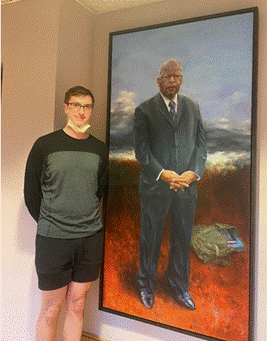
Rothman Renaissance: Art, Music, Humor and Law
Rothman was truly a modern-day Renaissance man. In addition to his scholarly legal writings, art was woven throughout every aspect of Judge Rothman’s life.
He sketched in laws school and created editorial cartoons poking fun of powerful people and institutions. He painted portraits, drew places, crafted love letters, and used watercolors to create notecards of exotic flowers.
Rothman’s t-shirts designs were used for over a decade to mark annual judge camps and trainings.
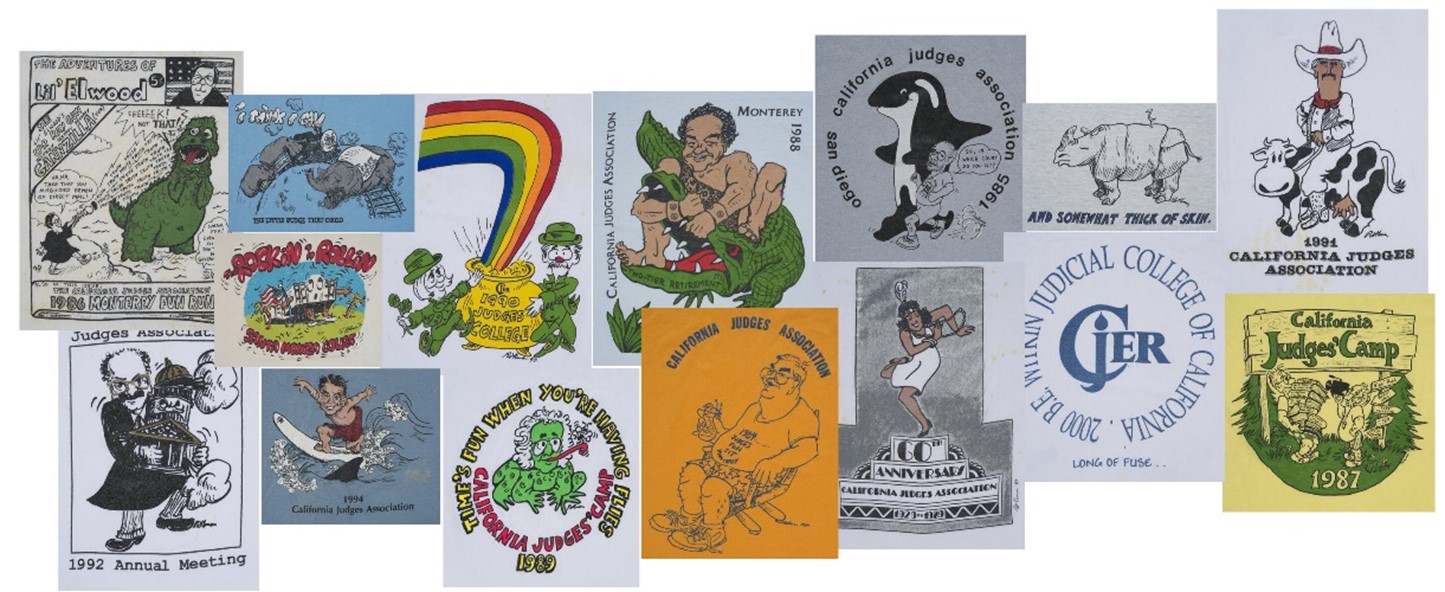
His artwork captured his sense of humor as he depicted the state’s most respected judges surfing in San Deigo, touring the San Francisco Bay Area, battling gators in retirement, running in robes, and getting up close to otters on the Monterey Bay.
Rothman’s sketches reveal his approach to collaborative marriage, where he might not have been as mindful about household chores as he was housekeeping duties in his courtroom.
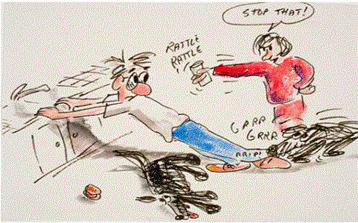
It was through his writings and art Rothman communicated his life experiences of the people, places, and spaces he witnessed throughout his life.
In 2009 Rothman painted his wife’s portrait. A year later he painted the portrait of John Lewis.
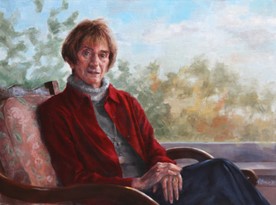
Quest for a More Perfect Judiciary
Rothman began his career before every home had a television, and before every office had a copy machine or computer. He lived in a world where kindness, compassion, and determination to keep personal and professional promises was a way of life. It was a time when ethics did not need to be taught in school and communication happened face to face, not in the shadows of anonymous social media posts. It was a time of civility. It was a time when public service was viewed as honorable, not profitable.
Rothman’s legal career was defined by the civil rights issues at the forefront of the country’s politics and legal proceedings, as reported in newspapers.
One public court judge in Southern California who participates in ongoing judge trainings where Rothman’s work is featured told the Vanguard on background, “Judge Rothman did more to promote public confidence in the judiciary than any other person ever. While many Californians will not recognize his name, they will have benefited from his contributions.”
Collectively, sitting, and retired judges expressed deep sadness after learning of Judge Rothman’s struggle with Alzheimer’s disease and recent death.
Journalists who had the privilege of meeting David M. Rothman, and his family, appreciated the welcoming attitude, and open access mindset offered by a man who dedicated his life to public service.
Attorneys speaking on Rothman’s passing noted they entered the legal profession during the Rothman Era and had confidence in the judiciary. All expressed hope Rothman’s work will be strengthened, not diluted, in the wake of his passing.
In an obituary published by the Daily Journal, retired Santa Clara County Superior Court Judge LaDoris Hazzard Cordell recalled co-teaching a class on judicial ethics with Rothman. “We were a team … [Rothman was] a terrific judge and terrific teacher,” she said. “If everyone were like him, we would have a perfect judiciary.”

